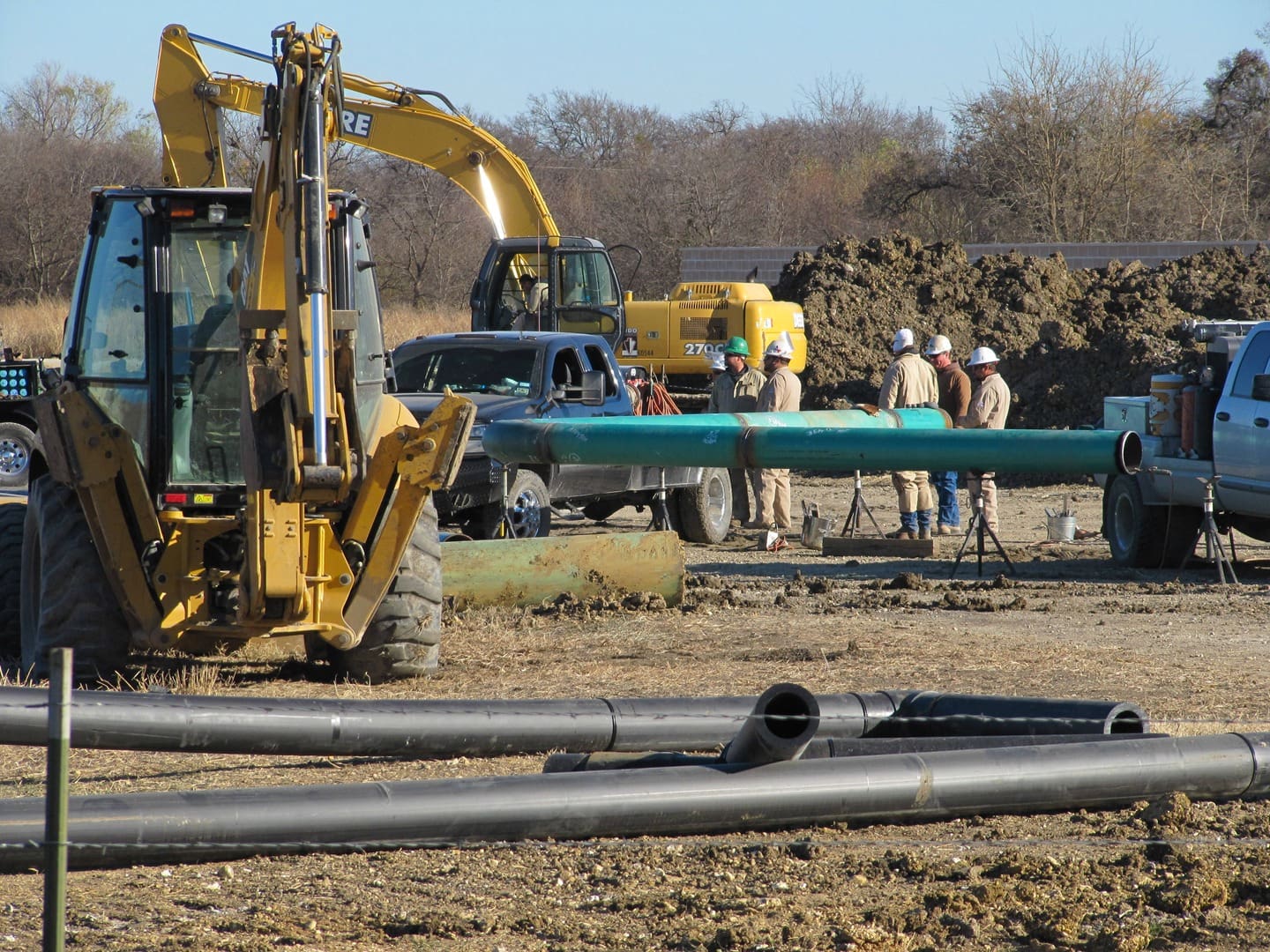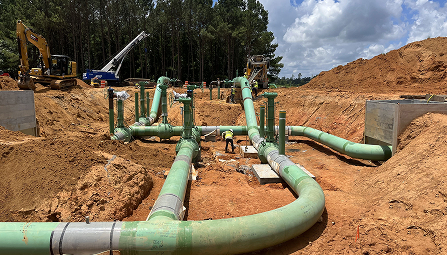The Vital Guide to Understanding Pipeline Construction Providers and Their Relevance
Pipeline Construction solutions are fundamental to the transportation of crucial sources such as gas, oil, and water. These services involve thorough preparation and implementation, adhering to rigid safety and security and ecological standards. As the industry adapts to modern-day difficulties, understanding its ramifications and components comes to be significantly crucial. What elements contribute to the expanding relevance of these services in today's economy? The following areas will certainly check out these vital elements.
Overview of Pipeline Construction Services
Pipeline Construction services encompass a range of activities necessary for the installation and upkeep of pipes utilized to move different materials, including gas, water, and oil. These solutions are important for guaranteeing the effective and secure motion of sources from one location to one more. The procedure generally starts with extensive preparation and design, which thinks about regulatory needs, environmental considerations, and logistical difficulties.
Once preparation is complete, excavation and grading of the land are carried out to prepare the website for Pipeline installation. This is complied with by the real laying of the pipelines, which involves welding or joining sections together to produce a continual circulation path. After installation, rigorous testing is executed to ensure honesty and security. Maintenance services are additionally offered to attend to any type of issues that might develop in time. Overall, Pipeline Construction services play a pivotal duty in sustaining facilities for energy and water distribution.
Key Parts of Pipeline Construction
An effective Pipeline Construction project depends on several key elements that guarantee the risk-free and reliable installation of the Pipeline system. Complete site assessments are essential, as they identify the geographical and ecological aspects that might impact Construction. Next, the choice of suitable products, such as fittings and pipes, is vital for protecting longevity and compatibility with the transferred compounds.
Advanced Construction methods, consisting of trenchless technology and directional exploration, improve efficiency and minimize ecological effect. Reliable project monitoring is another critical element, coordinating labor, devices, and timelines to fulfill job objectives.
Additionally, interaction among stakeholders, including designers, professionals, and neighborhood authorities, guarantees positioning on task specs and needs. Detailed top quality control steps throughout the Construction process make certain compliance with industry criteria and take full advantage of the Pipeline's operational lifespan. Collectively, these components form the backbone of a successful Pipeline Construction job.
Security Requirements and Rules in Pipeline Construction

Governing bodies, such as the Occupational Safety and Health And Wellness Administration (OSHA) and the Pipeline and Hazardous Materials Security Administration (PHMSA), set forth details needs that govern Construction methods. These include protocols for devices usage, employee training, and emergency situation reaction treatments. By applying these criteria, Construction companies not only secure their staff members but also protected public trust fund. Ultimately, rigorous security measures add to the long-lasting success of Pipeline tasks, guaranteeing they fulfill both environmental and functional assumptions.
Environmental Considerations in Pipeline Projects

Ecological considerations are indispensable to the planning and implementation of Pipeline jobs. These projects need to evaluate possible impacts on ecosystems, water sources, and local wildlife. Performing extensive environmental effect analyses (EIAs) is important, allowing stakeholders to determine and minimize risks prior to Construction begins.
Securing delicate areas, such as marshes and environments, typically calls for executing specific style attributes or alternate transmitting to minimize interruption. In addition, Pipeline operators are charged with developing techniques for protecting against leaks and spills, which can have damaging effects on the environment.
Interaction with neighborhood areas is important, as public worries can bring about project modifications that improve environmental management. Conformity with laws established by ecological agencies guarantees that projects satisfy sustainability standards, fostering a balance between infrastructure needs and environmental preservation. Eventually, dealing with environmental considerations not only safeguards nature however likewise promotes go now community trust and project practicality.
The Role of Technology in Pipeline Construction
Technology plays an important role in modern Pipeline Construction, enhancing efficiency and accuracy. Advanced surveying techniques allow for precise planning and implementation, decreasing ecological effect and job hold-ups. Furthermore, the combination of automation and robotics simplifies procedures, decreasing labor costs and boosting safety and security on Construction websites.
Advanced Surveying Techniques
Advanced evaluating methods play a vital role in the effective implementation of Pipeline Construction projects. These approaches take advantage of advanced technology to assure exact mapping and analysis of the surface where pipelines will certainly be set up. Techniques such as Geographic Details Systems (GIS), LiDAR (Light Discovery and Ranging), and 3D modeling allow engineers to assess the landscape and envision, determining environmental concerns and prospective challenges. By utilizing these innovative tools, groups can improve accuracy ready and placement, considerably reducing the risk of errors throughout Construction. Furthermore, real-time information collection permits instant adjustments and notified decision-making throughout the task lifecycle. Ultimately, these checking developments add to boosted efficiency, security, and sustainability in Pipeline Construction initiatives.
Automation and Robotics

Economic Effect of Pipeline Facilities
Pipeline framework plays an important duty in shaping local economies and helping with profession. By giving a reliable methods of carrying oil, gas, and various other assets, pipes decrease transport expenses and improve supply chain effectiveness. This framework attracts financial investment, stimulates job production, and fosters click to investigate financial development in surrounding areas.
In addition, the Construction and maintenance of pipes contribute significantly to neighborhood economic situations, creating many employment possibility in various industries, from design to labor. The increase of jobs commonly leads to increased costs in neighborhood services, even more bolstering financial activity.
Furthermore, pipelines improve energy safety by making certain a secure supply of resources, which is essential for household requirements and industrial operations. As regions come to be adjoined through Pipeline networks, they access to more comprehensive markets, enhancing competition and economic durability. The financial impact of Pipeline infrastructure is multifaceted, affecting both prompt local economic climates and wider local advancement.
Future Trends in Pipeline Construction Providers
The future of Pipeline Construction services is evolving in action to technical advancements, regulatory modifications, and growing ecological considerations. Technologies such as drones and robotics are simplifying evaluation and upkeep procedures, boosting security and efficiency. Automation is positioned to decrease labor costs and increase accuracy in Construction procedures. In addition, the enhancing focus on sustainability is motivating companies to embrace environment-friendly materials and methods, straightening with international initiatives to lower carbon footprints.
Regulative frameworks are also adjusting to attend to ecological effects, promoting greater transparency and responsibility in Pipeline tasks. The assimilation of clever modern technologies, including real-time monitoring systems, is expected to improve the dependability and performance of Pipeline networks. As energy demands shift toward sustainable sources, Pipeline Construction services will likely see an increase in jobs connected to biofuels and hydrogen transportation. On the whole, these fads show a transformative duration for the Pipeline Construction sector, concentrated on innovation and sustainability.
Frequently Asked Questions
What Types of Pipelines Are Commonly Constructed?
Various kinds of pipelines are frequently built, consisting of oil, gas, sewage, and water pipelines - Pipeline Construction Services. Each offers distinctive objectives, facilitating the transportation of important resources throughout areas while sticking to security and environmental regulations
How much time Does a Normal Pipeline Job Take?
The duration of a typical Pipeline task differs considerably, usually varying from a number of months to a few years. Variables affecting this timeline include project complexity, governing approvals, and ecological factors to consider that need to be dealt with.
Who Controls Pipeline Construction Business?
Pipeline Construction companies are managed by different federal, state, and neighborhood firms, including the Pipeline and Hazardous Materials Security Administration (PHMSA) and state public utility compensations, making sure compliance with safety and security and ecological requirements throughout the Construction procedure.
What Prevail Products Utilized in Pipeline Construction?
Usual products utilized in Pipeline Construction consist of pvc, polyethylene, and steel. Each product supplies unique advantages such as versatility, resistance, and longevity to deterioration, making them suitable for different applications in moving fluids and gases.

How Are Pipeline Construction Costs Approximated?
Pipeline Construction expenses are estimated by analyzing variables such as product expenses, labor rates, task intricacy, environmental factors to consider, and governing demands (Pipeline Construction Services). Accurate price evaluation guarantees effective budgeting and task preparation throughout the Construction process
Pipeline Construction services incorporate a variety of activities important for the installment and upkeep of pipelines made use of to move numerous substances, including oil, water, and gas. An effective Pipeline Construction project counts on several vital elements that assure the risk-free and reliable setup of the Pipeline system. Advanced evaluating techniques play an essential function in the successful implementation image source of Pipeline Construction projects. Different types of pipes are typically constructed, consisting of oil, water, gas, and sewage pipelines. Pipeline Construction prices are estimated by assessing variables such as material expenses, labor prices, task complexity, ecological considerations, and regulative needs.